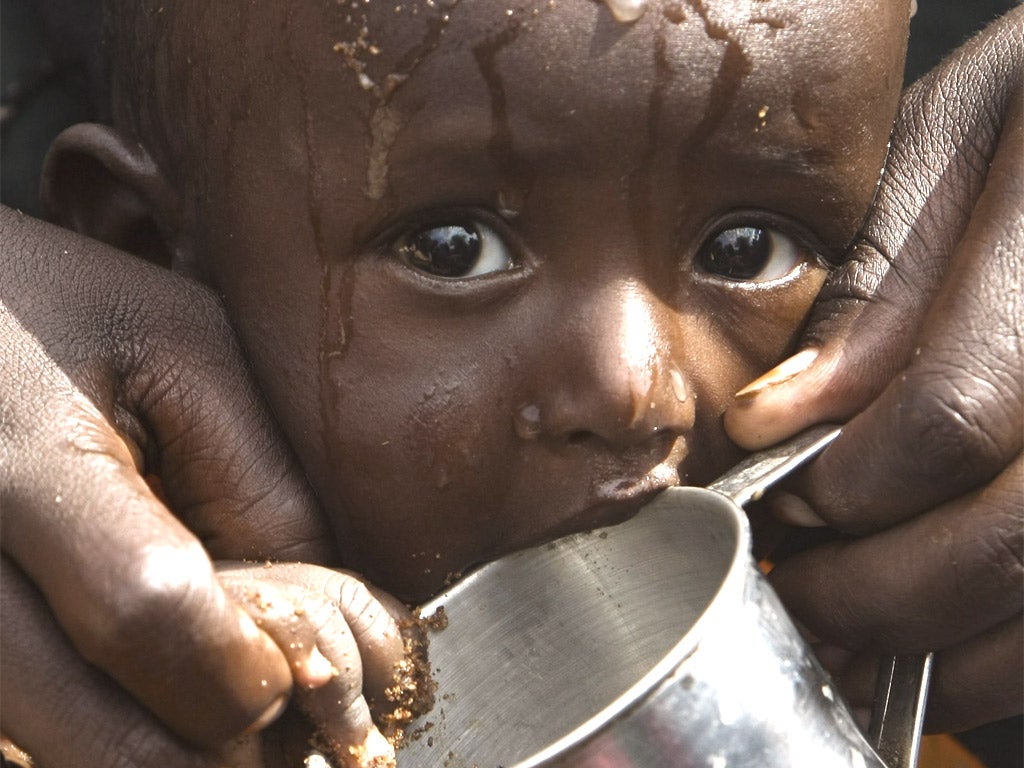The year the grains failed
Families are going hungry in the developing world after calamitous weather conditions decimated harvests. Michael McCarthy reports

Your support helps us to tell the story
From reproductive rights to climate change to Big Tech, The Independent is on the ground when the story is developing. Whether it's investigating the financials of Elon Musk's pro-Trump PAC or producing our latest documentary, 'The A Word', which shines a light on the American women fighting for reproductive rights, we know how important it is to parse out the facts from the messaging.
At such a critical moment in US history, we need reporters on the ground. Your donation allows us to keep sending journalists to speak to both sides of the story.
The Independent is trusted by Americans across the entire political spectrum. And unlike many other quality news outlets, we choose not to lock Americans out of our reporting and analysis with paywalls. We believe quality journalism should be available to everyone, paid for by those who can afford it.
Your support makes all the difference.World grain prices have risen so high that families in poorer countries are being forced to schedule "food-free days" each week, according to one of the leading experts on global agriculture.
The extreme rationing is an "an unprecedented manifestation of food stress," according to Lester Brown, president of the Washington-based Earth Policy Institute, and the most respected environmental observer of food and agricultural trends.
While regional food shortages are far from uncommon, the sheer number of people in the developing world who can no longer afford to eat every day has appalled humanitarian workers. "We have not seen this before, where a family systematically schedules days where they do not eat, when they know they can't buy enough every day so they decide at the beginning of the week, this week we won't eat on Wednesday or we won't eat on Saturday," Mr Brown said yesterday.
Quoting figures from a report commissioned by Save the Children, he said that foodless days were now a part of life for up to 24 per cent of families in India, 27 per cent in Nigeria, and 14 per cent in Peru. The development was part of a long-term shift, he said, from a world food economy dominated by surpluses, to one dominated by scarcity.
Yesterday it was revealed that Britain's own 2012 wheat harvest is down by nearly 15 per cent after the wettest summer for a century, with analysts warning the shortage will push domestic food prices up still further, not least because the cost of grain feed largely determines the price of poultry and livestock such as pigs.
Yet Britain's situation is only part of a global process which is seeing grain prices rise to the highest level on record, causing enormous difficulties for poorer people in developing countries, where food typically accounts for 50-70 per cent of family spending, compared to an average of around ten per cent in the West.
The biggest driver of recent increases has been the catastrophic drought in the US this summer, which cut the harvest of corn (what we in Britain call maize) by 13 per cent to 272 million tonnes, from 314 million tonnes in 2011; and the shortage is combined with the increase in demand for corn to make biofuels – as of this year, more corn now goes into ethanol production in America than goes into animal feed.
The 2012 global grain harvest in total is expected to be 2,236 million tonnes, compared with 2,309 million tonnes in 2011, a drop of about three per cent, but this is about four per cent in per capita terms, as 80m people per year are being added to the world population. As a result, corn prices hit eight dollars a bushel in August, the highest level ever recorded.
Although people in Britain have been insulated from recent major surges in the price of food, such as that in 2008-9, some observers think this may be about to change, not least because so much of our food is imported. "There certainly are price pressures in the system, which are coming from poor wheat harvests in this country but also in the other big wheat producing countries," said Richard Dodd of the British Retail Consortium.
"The most recent figures are that wheat prices are up something like 29 per cent compared with a year ago. Our own figures for the shop price inflation for food show that it has been very, very stable – it has been 3.1 per cent for the last three months which is actually a two-year low. There is no food price explosion going on – but there are pressures in the system that will work through."
Peter Kendall, President of the National Farmers' Union, said that although the drop in Britain's 2012 wheat harvest was just under 14 per cent, many arable farmers were down by 20 to 30 per cent on their wheat crop because of the torrential and continuous rains of the summer.
"It's been soul-destroying for the farmers growing the crops," he said. "In some cases you looked from the outside and you thought, this crop will do over four tonnes to the acre – and it's been struggling to do three and some cases two tonnes to the acre."
Join our commenting forum
Join thought-provoking conversations, follow other Independent readers and see their replies
Comments